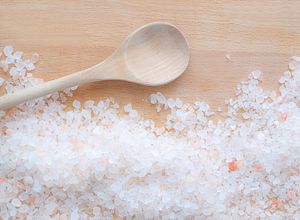The recent green light given by China’s National Development and Reform Commission (NDRC) to abolish China’s state salt monopoly (China Salt) in 2016 signals the likely end of a 2,000 year-old tradition first established during the Spring and Autumn Period. Considering the significance of this development, it is worth asking the question: What drove the Chinese government to take such action?
Although China Salt’s official mission statement makes clear that it “shoulders the mission of ensuring national wellbeing, and the prosperity of traditional national industry,” its dossier suggests otherwise. In fact, the existence of China Salt is detrimental to the maturation of the industry, with severe repercussions for production, price, and the distribution of salt products.
Privately owned small and medium enterprises populate the production end of China’s salt industry. Since these companies operate under a monopoly, they must abide by the rules and regulations laid down by China Salt. In the past decade, producers have taken serious financial losses due to changes in governing policies that were created to give China Salt a greater share of the profit. First, to be able to produce edible salt legally one must acquire a quota from the local salt industry bureau (SIB). To compete for the limited numbers of quotas, salt producers must partake in various forms of bribery. Thus, the companies that were granted a quota are often times not the most cost-effective producers, but the most effective at offering bribes. In addition, there have been numerous reports of local SIBs demanding kickbacks from producers. Should any producer dare to resist, it would be labeled an illegal salt producing operation and be subject to harsh penalties.
The corollary of this bribe-for-quota system is a steep decrease in competition that led to a complete absence of innovation. A 2009 study shows that the yield from a single Chinese salt field is four to eight times less than that from a field of equal size in a technologically advanced foreign country. In terms of producing sea salt, a foreign sea salt field could produce close to 10,000 tons per year, ten times the production capacity of a Chinese sea salt field of similar size.
The most important reason for China Salt to exist, according to Ma Zhanping of the NDRC, is to ensure iodized salt is part of the Chinese diet. In recent years, however, this function has devolved into a way for China Salt to squeeze more money out of the pockets of both producers and consumers. The salt market’s price stability does not prevent China Salt from using schemes to artificially hike up the prices. Despite the result of a 2010 study that shows the average Chinese citizen consuming way too much iodine, China Salt continues to enforce inflexible rules on the production and distribution of iodized salt because it can be sold at a much higher price than regular salt (regular salt sells for 400 RMB per ton, after adding iodine it is priced at 1500-2000 RMB per ton). Another method of artificially raising the price of salt is through repackaging schemes that created enormous profits for SIBs via forcing producers to swap inexpensive old packaging with expensive new packaging.
These price control stratagems disrupt the natural flow of the free market and the interests of the public. China Salt and its associates are the sole benefactors in this case, and China Salt has been less than adroit in sharing the largesse. Reports have exposed the lavish lifestyle of company functionaries, which includes costly travels overseas, shopping sprees, and the stashing of public funds into private accounts.
China Salt strictly controls the distribution of salt products. With the power to enact and enforce regulations, the company places severe limits on the free exchange of goods. In February 2013, Chinese e-commerce giants Taobao, Dangdang, and 360buy removed all of their edible salt products in compliance with an online “salt ban.” This form of imposed distribution restriction is a primary tool used by China Salt to stifle competitors. Local SIBs also fear competition with each other, but the main strategy adopted by these bureaus is the use of protectionist policies to shield their own economic fiefdom from the influx of outside goods. Transportation of salt across county, city or provincial limits without first obtaining a permit is strictly forbidden. On October 15, a restaurant owner surnamed Huang was punished by salt authorities when he brought a case of salt from his old noodle shop in Xinzheng to his new establishment in Zhengzhou. Though a public outcry forced the local SIB to subsequently return Huang’s confiscated salt and cash, the case suggests the incompetence of China Salt and its dubious role.
There have been talks of reforming China Salt since 2004. But repeated lobbying efforts by the company have managed to delay reforms. Ten years on, little has changed in how the industry operates, with China Salt only becoming more ossified and bureaucratic. Its essential raison d’être – ensuring iodized salt is part of the Chinese diet – became obsolete a long time ago, and could be handled without difficulty by the free market.
Public demand for reforming the salt monopoly has only grown stronger in the wake of the episode involving SIB agents and the unfortunate Mr. Huang. It was therefore no surprise when the Chinese leadership decided to let China Salt take the first cut in the campaign of state-owned enterprise reform.
Zi Yang is a M.A. candidate in the Asian Studies Program at Georgetown University and the current Managing Editor of the Georgetown Journal of Asian Affairs.

































